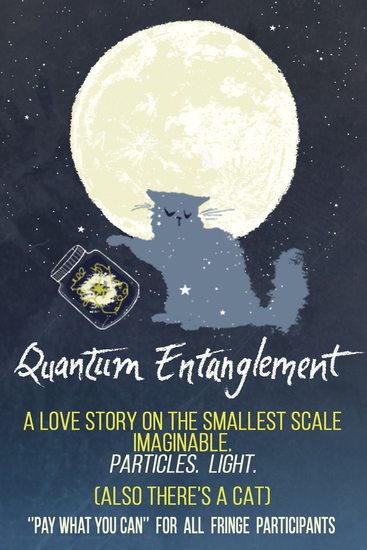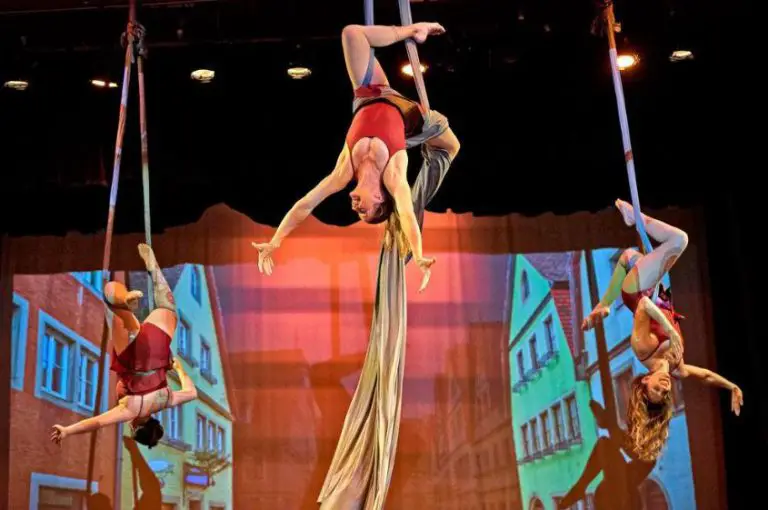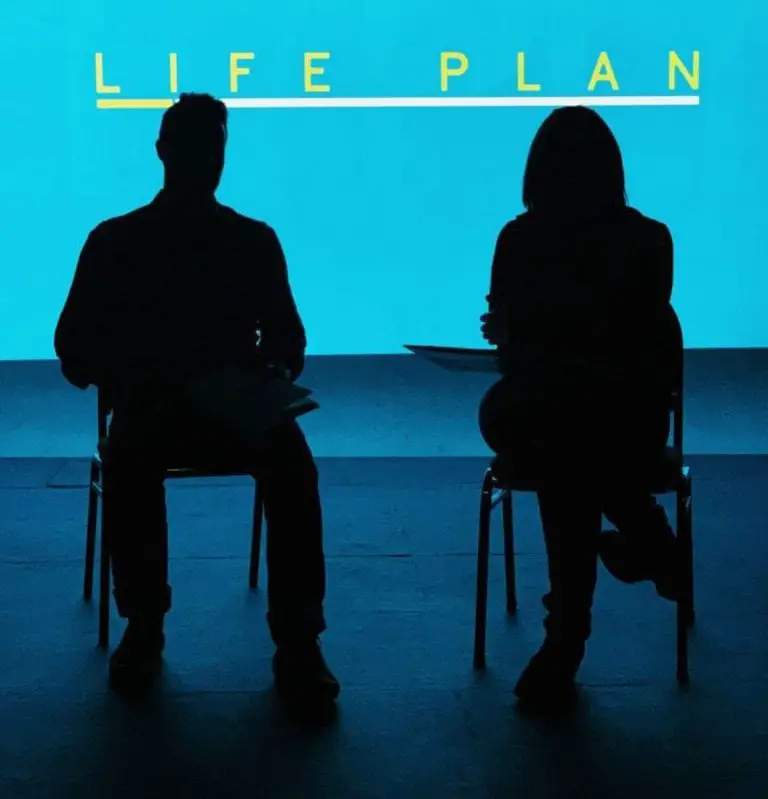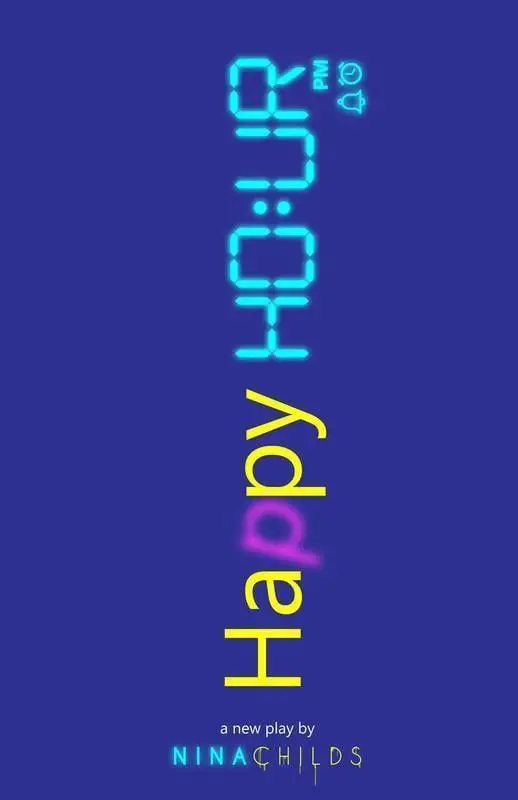Quantum Entanglement
Quantum Entanglement is a new performance experience by Lucid Dramatics at the Hollywood Fringe Festival. Directed by Shane Wood with dramaturg Amy Shine, Quantum Entanglement is a theater experience with themes of love, family, faith, and science. Described as “the most romantic theory in physics,” this story is a love story on the smallest scale imaginable. A miraculous journey of self-discovery through cosmic light to illuminate the beauty of the dark, both in space and mind. A portrait of a nuclear family awakened by a fractured past: An astrophysicist looking to the moon to find his missing wife; A mother swallowed up by the dark; A daughter desperate to heal them both; And an experiment to connect them all (Also, there’s a cat).
We had the pleasure of sitting down with Katelyn Schiller, one of the founders of Lucid Dramatics to discuss the inspirations, heart, and romance that is Quantum Entanglement.
Lucid Dramatics
For those of you unacquainted with Lucid Dramatics, Schiller explains that they were founded in 2014 by Carla Neuss, Payden Ackerman, and herself. “One night, we sat on a patio, drinking wine, eating guacamoles, and puzzling over why we felt a lingering gap in the emotional connection between audience and performance in traditional theater. Stories were entertaining enough, but they weren’t personal—and they weren’t making a meaningful change in our lives.” These three began to ponder the idea of creating something on their own to address this gap. With skill sets that complimented each other and the fact that they all got along wonderfully, Lucid Dramatics was born.
Since their inception, they have curated four wonderful and innovative productions. Their shows have encouraged self-awareness, communication, honesty, and self-discovery; and Hollywood Fringe is the perfect venue to share this new story with so much heart.
Inspirations of a Romantic Theory
“When I tell people this, they all give me those smiling nods; my father is this humbly brilliant astrophysicist…and he got a bunch of artists for children,” Schiller jokes with a smile. “But our science projects always rocked!” She continues to tell us tales of her father taking her and her brothers on his trips to observatories all over the country when he was doing research. She recalls, “At first it was super cool because I’d got to stay up all night! But then all we did for hours and hours was sit in the quiet, look through telescopes, track all those little dots on monitors, and clack away at a keyboard. I’d moan, ‘This is so boring! Why do you like this?’ One look at his face and you’d get it. He was completely enamored. He looks at the night sky like he looks at my mom; totally lost and in love with this beautiful mysterious thing he’ll never completely figure out. I think I’ve always wanted to be someone to talk to about these things he loves.” Her passion is infectious and I am thoroughly excited just hearing her talk.
One of Schiller’s goals is to explain science through the lens of art. This was her way of communicating with her dad—through her art. “I was lucky because he thinks I’m wonderful. I would throw myself into this world of his and learn its language for the sake of telling his world to others.” And her dad communicated back—using his science to inspire her art. “Did I mention this show was his idea?” I shake my head and she continues, “He was like, ‘This theory I just read about would make a great play!’ and he had this realistic sci-fi plot all thought up when he pitched it to me. It was adorable. Then he handed me a stack of information on Quantum Entanglement, including a patent on a Quantum Teleportation Timing System, research on how great diamonds are at Quantum Entanglement, and theories on how we could one day use diamonds to teleport thoughts. It was insane how real this thing was.”
Quantum Entanglement is an interesting blend of science and faith—and while many think that science and faith are at odds, Schiller doesn’t believe that they are. “I think people create science and faith as being at odds, I don’t think they have to be. Here again, my father is a prime example of its potential balanced marriage. He sees God every night when he looks up at the stars; he’s always asking questions and exploring every possibility.

Influences on a Style
While Schiller and her father’s heartfelt communication inspired the narrative and direction, there are other influences on her style as a storyteller. “My biggest storytelling influence is absolutely be Hayao Miyazaki. I have all his films. I’m such a nerd about it too. I put one of his movies on every time I’m feeling a little sad and don’t know why, and need to remember that the world is doing the very best it knows how right now, and I can find kindness in that.” It’s easy to see in Schiller’s work that she likes to connect ideas to a bigger picture and that things are beautiful. Further, when it comes to creating an atmosphere, mood, or tone, Schiller finds her inspiration in video games. “The mood, lighting, and music shifts level to level. Even in a one game, the inspirations are endless.” She is not a novice to games either. “I play a lot of video games. I’m easily over 100 hours into The Legend of Zelda: Breath of the Wild right now. I don’t want to finish it.” Both of these amazing influences can be seen in some capacity in her whimsical and playful imagery used for this experience.
Physics Not Needed
I ask Schiller “Will people need a basic understanding of physics to truly appreciate this show,” and Schiller retorts quickly: “Aw, hell no! For my own sake, I needed the theory to be as easily digestible as possible. The words Quantum Entanglement sound scary for us non-science/math inclined persons. I’ve learned this while experimenting how to market the show. I’d meet other theatre practitioners in a bar and they hear the title and it’s usually met with ‘Ooh, really?’ or ‘Oh, dear god.’ But as soon as I talk about this incredible thing that happens with light and every person we’ve ever met has touched our life on a quantum level, and somewhere there are a handful of light particles that remember it, people get all gooey. Love resonates. And love on a quantum scale? Our particles falling in love? It’s great. But yeah there are a couple little bites in there that the science enthusiasts will geek out over too.”
An Atmospheric Detective
In a black box theater with four performers, anything is possible. This is one of Schiller’s favorite parts. She loves being a detective. “We get to solve big wonderful problems like how we can create a bold evocative environment that stimulates and inspires, but bring it to life as minimally as possible.” As this piece is being designed specifically for the Hollywood Fringe Festival and has not been produced elsewhere, mobility and low cost of entry is key. While Schiller did not want to spoil too much of the effects, sets, and atmospheres of the experience, she did mention a few of the trickier questions that she faced: “How can you hold a particle of light? If your subconscious could teleport through light, where would it go?” Maybe we will get answers to these questions and more in Quantum Entanglement.
What Will You Feel?
One of Schiller’s main goals is to create an emotional connection with her audience. “I want people to walk out of the show with exactly whatever they felt. I’ll be dying to hear what resonated with them and why!” This piece, much like poetry, is meant to interpreted through the audience’s lens of experience—and with that, the feelings and interpretations can be endless. Schiller continues, “Even though I’m showing you this really cool physics thing through a theatrical lens, the theory is a vessel for a deeper need to complete a story in my life. It’s definitely the most personal thing I’ve ever made, so with that comes with alllllllll the feels. But through rewrites and feedback, I’ve learned that it is an extremely accessible performance. It’s a moment when we, as adults, suddenly see our parents, or whoever raised us, as human beings. Not demigods. What kind of relationship is possible then? What memories from your past can you extract the meaning from, and let them be themselves in the present?”





